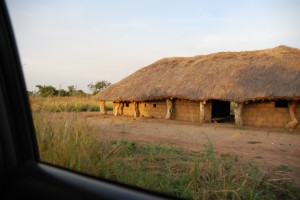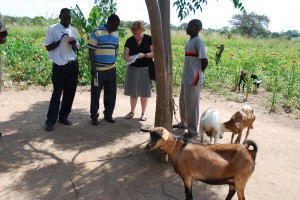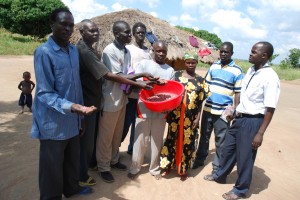We arrived in Soroti just after dark on Monday, Nov. 9. Exhausted from driving all day we decided to postpone our orientation until after breakfast and sat down to our first dinner at the guest house where we were staying.
The guest house was very comfortable, surprisingly. Running water (sometimes hot!) and continuous electricity were luxuries I hadn’t planned on. The food was good and local, consisting of choice of either chicken or grilled whole fish; rice, cassava, or chapati; and cabbage or mrenda (greens).
The next morning over a breakfast of scrambled eggs, tea, instant coffee, and toast and jam we were briefed on the background of the organization that we were to be evaluating. This church-based organization, KIDO, has been working in communities since the end of the LRA. For this evaluation we were supposed to try to ignore the relief efforts and focus instead on the food security and income generation projects that consisted primarily of forming community groups, providing training, and distributing goats, cassava cuttings, and groundnuts. We were split into three teams of five people and were given a list of questions designed to determine the program’s effectiveness, community leadership development, holistic-ness, sustainability, impact, and gender and environment efforts. My group included CRWRC-Uganda program consultant Joseph; CRWRC-Uganda Bridger Carol; a Bishop from the PAG church; and Michael, a development worker for KIDO.
 We set off for our first community, and I wasn’t sure what to expect. We were greeted by much singing and dancing, and filed into a community building that was made of mud and a thatched roof. After the men were seated on one side and the women on the other, and the customary introductions, the chairperson of the community group proceeded to give a detailed report about how each of the groups used the goats and groundnuts that they were given. Some groups’ goats had multiplied, others had died, some had even had so much success in breeding that they were able to trade them in for oxen, allowing them to plant more food. The drought had killed some of the cassava cuttings, floods the next season, and some had planted their groundnuts only to dig them up again to eat when they heard rumors of the Korny rebels (LRA) returning.
We set off for our first community, and I wasn’t sure what to expect. We were greeted by much singing and dancing, and filed into a community building that was made of mud and a thatched roof. After the men were seated on one side and the women on the other, and the customary introductions, the chairperson of the community group proceeded to give a detailed report about how each of the groups used the goats and groundnuts that they were given. Some groups’ goats had multiplied, others had died, some had even had so much success in breeding that they were able to trade them in for oxen, allowing them to plant more food. The drought had killed some of the cassava cuttings, floods the next season, and some had planted their groundnuts only to dig them up again to eat when they heard rumors of the Korny rebels (LRA) returning.
 As they painstakingly accounted for every goat and bag of groundnut, my heart broke. I did my best to not show my emotions as we were there to foster independence and encourage initiative. When we asked what impact these inputs had provided, one woman who had lost everything she had in the war, including her family, said that when she returned from the camps she had nothing, and would have surely died had it not been for KIDO.
As they painstakingly accounted for every goat and bag of groundnut, my heart broke. I did my best to not show my emotions as we were there to foster independence and encourage initiative. When we asked what impact these inputs had provided, one woman who had lost everything she had in the war, including her family, said that when she returned from the camps she had nothing, and would have surely died had it not been for KIDO.
And you know what? I felt like an ass. Who were we to give recommendations to an organization that was doing its best with very limited resources and working to develop communities of people who were traumatized by 20 years of civil unrest and brutality, and had nothing except the goats and groundnuts we had provided? Still, I knew that our donors demand accountability, and that this information would help provide a vision for self-reliance that would someday come to fruition, no matter how far off it seemed.
 After the interviews the community asked us to sit, and gave us Coke, stewed goat, mrenda stew, rice, and cassava ugali. The stewed goat didn’t taste much different than beef, although it had a bit more gristle and a bit of a gamey flavor. They watched while the visitors and the village elders ate, and then bid us goodbye as we headed back to the guest house to debrief.
After the interviews the community asked us to sit, and gave us Coke, stewed goat, mrenda stew, rice, and cassava ugali. The stewed goat didn’t taste much different than beef, although it had a bit more gristle and a bit of a gamey flavor. They watched while the visitors and the village elders ate, and then bid us goodbye as we headed back to the guest house to debrief.
From sunup to sundown for the next two days we would repeat these community visits, and although we would sometimes get chicken or beef instead of goat, I became accustomed to the local dishes and even enjoyed them and became quite good at eating with my hands.
After the evaluation, two CRWRC staff and I continued on to Gulu to meet with another partner for which we are trying to raise funds. Over the next couple of days we ended up asking many of the same questions that we asked in the evaluation process, I suppose out of habit. I was amazed at how each of the communities was so grateful, and how far they had come. If I had been in that situation I don’t know that I could restart my life like that. At our final village visit, we were given a live chicken. At that point, I seemed at peace. I’m not sure why, but by accepting that chicken a certain calm came over me. The receivers had become givers. They would be OK. They had hope.


Oh, the things we take for granted. Unbelievable. It makes me very grateful for the roof over my head, clothes on my back, and the fridge and freezer full of food.
You are right…when the receivers become givers, it is a good sign. We are at a point in our lives where WE have had to become takers, instead of being on the giving end. Trust me when I say, it is very humbling. It is far easier to be a giver!
Thank you so much for sharing this. It was very memorable traveling with you!